
The Lockheed HC-130 is an extended-range, search and rescue (SAR)/combat search and rescue (CSAR) version of the C-130 Hercules military transport aircraft, with two different versions operated by two separate services in the U.S. armed forces.

The Sikorsky MH-60T Jayhawk is a multi-mission, twin-engine, medium-range helicopter operated by the United States Coast Guard for search and rescue, law enforcement, military readiness and marine environmental protection missions. It was originally designated HH-60J before being upgraded and redesignated in 2007.

The Airbus Helicopters H125 is a single-engine light utility helicopter originally designed and manufactured in France by Aérospatiale and Eurocopter. In North America, the H125 is marketed as the AStar. The AS355 Ecureuil 2 is a twin-engine variant, marketed in North America as the TwinStar.
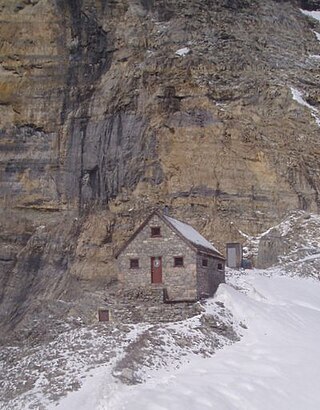
The Abbot Pass hut was an alpine hut located at an altitude of 2,925 metres (9,596 ft) in Abbot Pass in the Rocky Mountains in Alberta, Canada. It was nestled between Mount Victoria and Mount Lefroy, straddling the Great Divide, which, in this region, defines the boundary between Banff National Park in Alberta and Yoho National Park in British Columbia. While close to the border, the hut lay entirely in Banff National Park, and was the second-highest permanently habitable structure in Canada. The hut was maintained by the Alpine Club of Canada.
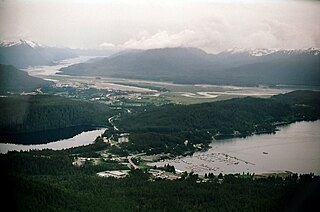
Auke Bay is a neighborhood located in the city and borough of Juneau, Alaska, that contains Auke Bay Harbor, Auke Lake, the University of Alaska Southeast, an elementary school, a church, a post office, a bar, a coffee shop, a waffle house, a thrift shop, a Thai restaurant, and one convenience store.

The 176th Wing is a unit of the Alaska Air National Guard, stationed at Joint Base Elmendorf-Richardson (JBER), Anchorage, Alaska. If activated to federal service, components of the Wing are gained by several United States Air Force Major Commands.

Mount Hood climbing accidents are incidents related to mountain climbing or hiking on Oregon's Mount Hood. As of 2007, about 10,000 people attempt to climb the mountain each year. As of May 2002, more than 130 people are known to have died climbing Mount Hood since records have been kept. One of the worst climbing accidents occurred in 1986, when seven high school students and two teachers froze to death while attempting to retreat from a storm.

The 210th Rescue Squadron is a unit of the Alaska Air National Guard 176th Wing located at Joint Base Elmendorf-Richardson, Anchorage, Alaska. The 210th is equipped with the HH-60G Pave Hawk helicopter.
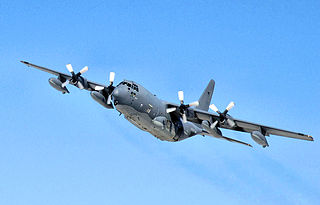
The 211th Rescue Squadron is a unit of the Alaska Air National Guard 176th Wing located at Joint Base Elmendorf-Richardson, Anchorage, Alaska. The 211th is equipped with the HC-130J Hercules.

On August 9, 2010, a privately operated amphibious floatplane crashed near Aleknagik, Alaska, killing five of the nine people on board. The fatalities included former U.S. Senator Ted Stevens, while the survivors included former Administrator of NASA and then-CEO of EADS North America Sean O'Keefe, his son, and future Deputy Administrator of NASA James Morhard.

Pan Am Flight 923 was a Douglas DC-4 operating from Seattle, Washington to Juneau, Alaska, which crashed into Tamgas Mountain on Annette Island, Alaska, on October 26, 1947. All 18 passengers and crew on board were killed.
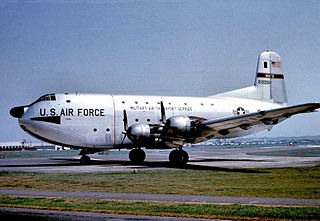
The 1952 Mount Gannett C-124 crash was an accident in which a Douglas C-124 Globemaster II military transport aircraft of the United States Air Force crashed into Mount Gannett, a peak in the Chugach Mountains in the American state of Alaska, on November 22, 1952. All of the 52 people on board were killed.

Mount Blachnitzky is a 6,552 ft (2,000 m) mountain summit in the city and borough of Juneau, Alaska, United States. It is a part of the Boundary Ranges of the Coast Mountains in western North America. It is located between Gilkey Glacier and Avalanche Canyon; it is named after Klaus Blachnitzky (1921-1988), a surveyor, geodesist, and explorer of the Juneau Icefield. Mr. Blachnitzky was the head surveyor for the Juneau Icefield Research Program. Much of his work was conducted in the vicinity of this summit. In August 1988, having completed almost two seasons instructing student surveyors and scientists in the science and practice of terrestrial field surveying and geodesy, he was killed when he slipped from a rock cleaver on the slope of Vaughan Lewis Glacier. The site of his death is four miles from the mountain named in his honor. In 2004, four climbers made a memorial climb of the previously unclimbed summit, leaving at the peak some surveying mementos of Mr. Blachnitzky's life. That first ascent was made by Scott McGee, Keith Daellenbach, Charles Daellenbach, and Fred Skemp III, on June 30, 2004, via the southwest cirque/south ridge. The mountain's name was officially adopted in 2007 by the U.S. Board on Geographic Names.
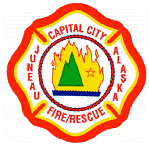
Capital City Fire/Rescue (CCFR) provides fire suppression and emergency medical services to the city of Juneau, Alaska, United States.

In the afternoon of 25 April 2015, a MW 7.8 earthquake struck Nepal and surrounding countries. Tremors from the quake triggered an avalanche from Pumori into Base Camp on Mount Everest. At least twenty-two people were killed, surpassing the toll of an avalanche that occurred in 2014 as the deadliest disaster on the mountain.

Alaska Central Express Flight 51 was an Alaska Central Express flight from Anchorage to King Salmon and Dillingham, Alaska. On 8 March 2013, the Beechcraft 1900C-1 serving the flight crashed into a mountain on approach to Dillingham Airport, killing both crew members on board.

In the early hours of 14 March 2017, a Sikorsky S-92 helicopter operated by CHC Helicopter under contract to the Irish Coast Guard crashed into the sea while supporting a rescue operation off County Mayo, on Ireland's west coast. All four crew members on board, Captain Dara Fitzpatrick, Chief Pilot Mark Duffy, winch operator Paul Ormsby, and winch man Ciarán Smith were killed.
Dara Fitzpatrick was the Irish Coast Guard's most senior helicopter search and rescue pilot. As a Captain, she piloted the Dublin-based Rescue 116 helicopter. She was killed in the 2017 Irish Coast Guard Rescue 116 crash in March 2017.

On 4 August 2018, a de Havilland Canada DHC-2 Beaver aircraft operated by K2 Aviation crashed in poor weather near Denali, Alaska, United States. All five people on board survived the crash, but died before rescuers were able to arrive at the scene. The five people consisted of the pilot and four Polish tourists.


















